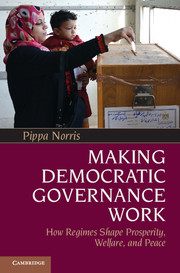Book contents
3 - The Regime Typology
Published online by Cambridge University Press: 05 November 2012
Summary
The unified theory outlined in the previous chapter predicts that human security will be advanced most effectively where inclusive and effective democratic institutions and procedures empower all citizens, so that they can express their demands and hold elected officials accountable for their actions, and, secondly, where state capacity is strengthened, so that the regime authorities can implement their policies and respond to public demands, including managing security, tax revenues, and the supply of public goods and services. It is argued that strengthening either liberal democracy or state capacity alone is insufficient; instead, it is proposed that the combination of both factors will provide the conditions most likely to generate effective and durable development outcomes, defined here in terms of prosperity, welfare, and internal peace. The next challenge is therefore to unpack these broad concepts, to consider how they can be operationalized, and then to apply the measures to classify regimes around the world and over time.
THE CONCEPT OF GOVERNANCE
To clarify our terms, following the Eastonian conception of a political system, three levels can be distinguished: the nation, the regime, and the incumbent authorities. The nation-state represents the community to which people belong. The regime constitutes the basic framework for governing the nation-state within its territorial boundaries. This includes the overarching constitutional arrangements and the core government institutions at national, regional, and local levels, reflecting the formal and informal rules of the game. Lastly, the authorities represent the elected and appointed actors holding office and the key decision makers in the public sector. Of these elements, nation-states are the most stable, although they can be dissolved and break up into their component parts, as in the case of Yugoslavia, Czechoslovakia, and Sudan, and new nation-states can succeed them, such as in Timor-Leste. Regimes are moderately durable, although they can also change, whether in response to conquest by an external power, popular revolution, elite coup d’état, or the dissolution of the nation-state, or through processes of reconstruction and peace building, such as a negotiated constitutional settlement following civil war.
- Type
- Chapter
- Information
- Making Democratic Governance WorkHow Regimes Shape Prosperity, Welfare, and Peace, pp. 43 - 70Publisher: Cambridge University PressPrint publication year: 2012



